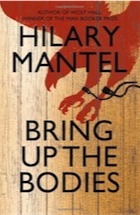Bring Up the Bodies is first sequel to triumph in prize's 43-year history, and author is first woman and first Briton to win twice
Hilary Mantel has made Man Booker prize history by becoming the first woman and the first British writer to win the literary award twice.
Receiving the prize, Mantel joked: "You wait 20 years for a Booker prize and then two come along at once."
Bring Up the Bodies, the blistering and bloody second instalment of her trilogy charting the life of Thomas Cromwell, was also the first sequel to triumph in the prize's 43-year history. The first instalment, Wolf Hall, won three years ago.
The chairman of the Booker judges, Sir Peter Stothard, called Mantel "the greatest modern English prose writer" working today, and said she had "rewritten the book on writing historicalfiction".
"We are very proud to be reading English at the time she is writing. I don't think I've read any English novelist in recent years who has such complete control over the way she uses prose to do what she wants to do, like a singer or a pianist," Stothard said.
Mantel, 60, joins the Australian Peter Carey and the South African JM Coetzee as a double Booker winner. She triumphed from a shortlist that was striking in its contrast to last year, when judges emphasised readability. This year it was about the power of prose and re-readability.
"There is no point in having a text for this prize that is dead as soon as it is read," Stothard said. "There are many perfectly good books for which that is true – they are a good read, but you wouldn't want to read them again. This prize is for books that will be read in decades to come and each time you read them they reveal something different."
The 2012 shortlist included challenging books, not least the hotly tipped Umbrella, by Will Self, written in a high modernist stream of consciousness with barely a paragraph break, let alone chapters. The others were The Garden of Evening Mists, the second novel from the Malaysian writer Tan Twan Eng; Deborah Levy's Swimming Home; and two first novels – Alison Moore's The Lighthouse and Jeet Thayil's Narcopolis.
Mantel, who has embarked on writing the third instalment, said the award was a "vote of confidence" and "act of faith". But is it not also enormous pressure? She told journalists: "When I start writing it I'll forget all of this because every day has its new problems … it's you struggling with your subject matter and a blank screen."
She said Bring Up the Bodies was "a more fully achieved book than Wolf Hall. Formally, it probably has the edge."
Three years ago, she said she would be spending the prize money on "sex, drugs and rock'n'roll". On Tuesday night, she said it would be spent on rehab, before adding a more pragmatic answer – "my pension, probably".
The judges' decision, reached in two hours and 16 minutes, came after "a rigorous process of literary criticism", said Stothard, who edits the Times Literary Supplement. There was no vote, which he said would have been an act of desperation.
"We didn't allow anybody to say 'I like this', 'I really enjoyed it', 'this is the one for me'. By the very nature of that, each book was analysed and argued over and the ones for which arguments were weaker than others fell away."
Stothard said he thought Bring Up the Bodies "utterly surpassed" the achievement of Wolf Hall, although he stressed the judges did not discuss that first novel. "It is an extraordinary book in its own right but it is tighter. I think she has learned lessons from Wolf Hall in the way that the prose is written."
Bring Up the Bodies is more condensed than Wolf Hall in that it charts the nine months of events in 1535 that lead to the execution of Anne Boleyn. It is one of the greatest, best-known stories in English history, yet Mantel "is able to bring it to life as though for the first time", Stothard said.
"It is a bloody story, but Hilary Mantel is a writer who thinks through the blood and uses her art and power of prose to create moral ambiguities and the real uncertainty of political life then and a pale imitation of a political life now."
Stothard said he saw "as much Don Corleone in this book as DH Lawrence", in that the moral ambiguities of Cromwell that Mantel explores could be from The Godfather, and the "description of the English landscape and the characters in this book could be out of The Rainbow".
Wolf Hall became a huge bestseller, a prospect that now awaits Bring Up the Bodies. Jonathan Ruppin, web editor of Foyles bookshops, said: "This rare double Man Booker win confirms her output as essential reading Mantel has been writing superb fiction for much longer than she has been winning major awards, so many readers will soon discover that she is their new favourite author. There's every possibility she might pull off a unique treble when she completes the trilogy."
The third book is to be called The Mirror and the Light, and the works will get a wider audience as the BBC has bought the rights. A six-hour adaptation of the first two books, by Peter Straughan, is planned for late 2013.
The £50,000 prize was handed out at London's Guildhall after a judging panel consisting of the Downton actor Dan Stevens, the academic and critic Dinah Birch, the historian Amanda Foreman and the academic and writer Bharat Tandon debated who should win on Tuesday afternoon.
It was not a unanimous decision in the sense that everyone would have picked it if put to a vote, but Stothard said: "There was absolute consensus that the most powerful arguments were those deployed for Bring Up the Bodies."


No comments:
Post a Comment